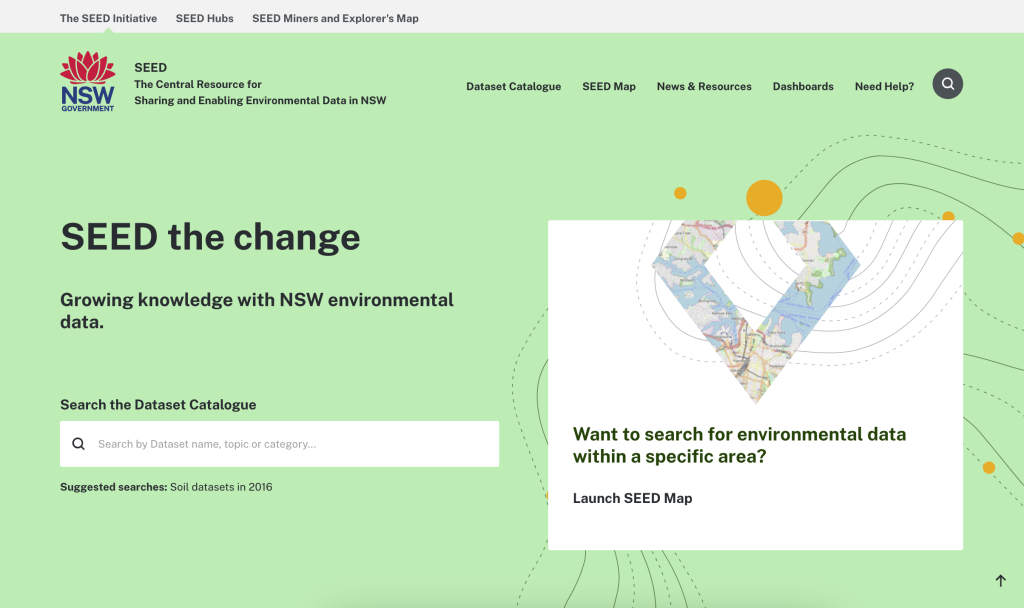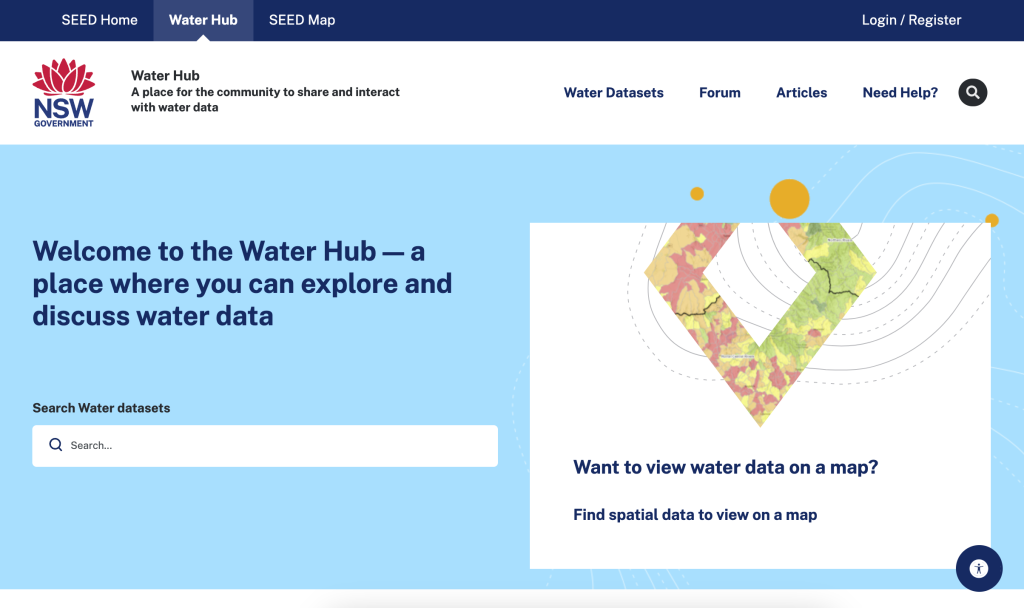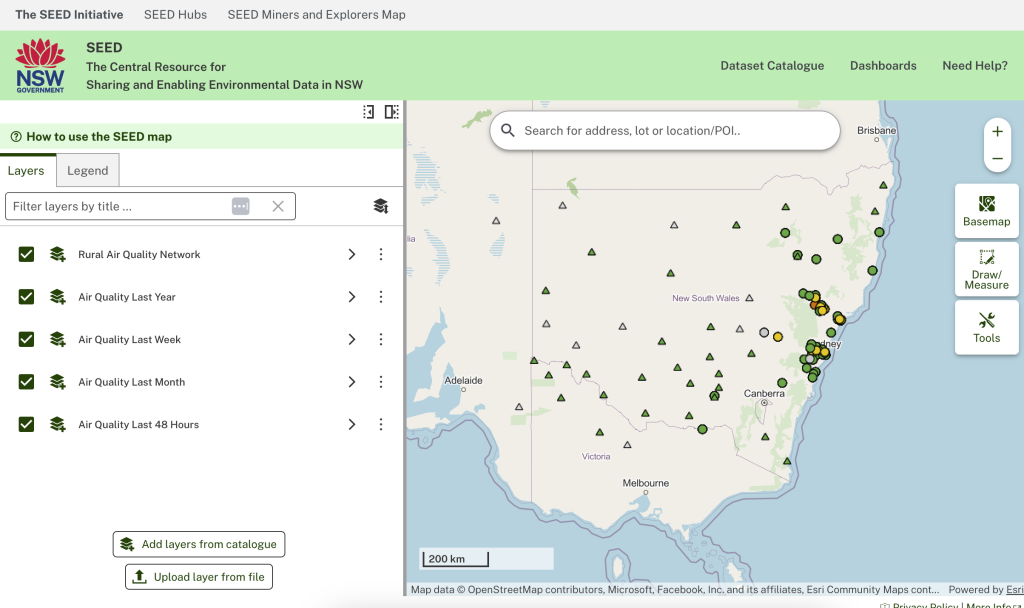The Sharing and Enabling Environmental Data portal (SEED) was launched in 2016 to provide a centralised place where the community, industry, consultants, NGO’s, researchers and government can come to search for, access, contribute and share NSW environmental data. All of SEED’s data is publicly accessible, adhering to best practice governance and metadata standards, and championing NSW Government’s Open Data Policy. Providing a single, accessible and reliable point for sharing quality, integrated environmental data has built trust in, and enabled better evidence-informed research, and decision making, ultimately contributing to positive environmental outcomes.

Since its establishment, the SEED portal has always been evolving to meet the increasing demand for comprehensive environmental data to effectively facilitate transparent decision making. Interactive dashboards, linking data to research, reports and strategies, and providing additional information on its spatial data, were added to SEED a couple of years ago. Most recently, it added a multi-hub service with the launch of several integrated themed hub environments.
The SEED hubs take the site’s functionality to the next level, enabling it to provide a service where the experts create their own dedicated space to engage with their users and stakeholders around themes of data available on SEED. Through this service, communities create their own powerful and fit-for-purpose insights.
The first of these, the Water Hub, went live in 2023. This is designed to offer ‘a space for the community to explore information and engage with one another regarding water datasets,’ and is administered by NSW Department of Climate Change, Energy, the Environment and Water (DCCEEW).

Four additional Hubs have been introduced since then. The Air Quality Hub contains data regarding air quality monitoring in NSW and is administered by DCCEEW’s Climate & Atmospheric Branch in collaboration with The Operational Network of Air Quality Impact Resources.
The Imagery Hub is a centralised repository for a wide range of satellite imagery for NSW.
The Natural Capital Accounting Hub is a space to explore and engage with information relating to natural capital accounting, a framework for integrating economic and environment data to develop improved insights into environmental assets and ecosystem shifts. It is administered by DCCEEW’s Natural Capital Markets and Accounts team.
The Natural Hazard Science Hub presents science and monitoring of the impact of natural hazards, to build a deeper understanding of the science behind these events and inform evidence-based policy and management decisions. It is administered by DCCEEW.

SEED was always envisioned as a place for discovering and sharing environmental data to enhance public knowledge, policy and research development, and decision-making. While users engaged in discussions about specific data topics outside of SEED, there was no central space within SEED for people to have conversations that were important to them and to provide feedback on subject based environmental datasets.
The hubs enable SEED to provide a cost-effective and lightweight service that is available to organisations wanting to engage with their customers and stakeholders around themes of data, available on SEED. The infrastructure is designed to be flexible and scalable, making it adaptable and responsive to customer and stakeholder needs. This includes sharing data insights and discussing data by creating threads about specific datasets. While each of the hubs may have a different key audience, the information available on all of them is aimed at engaging as broad a community as possible. In addition to members of the public, this includes industry, academics, national, state and local government employees, and not for profit agencies.
SEED commissioned Link Digital in early 2023 to adapt the then Citizen Science Infrastructure Hub into a multi-hub portal using a single code base. The redesigned identity was launched in 2023. In cooperation with the SEED team, the Link Digital team worked to integrate the new hubs with the existing CKAN (Comprehensive Knowledge Archive Network) instance, which is in the SEED portal. Link Digital improved the accessibility features to ensure users can more easily browse the data they need and used Drupal, a free and open-source content management system suitable for developing web applications, to create a slicker, fresher look.
The hubs are integrated to the main SEED portal via the datasets. SEED currently hosts over 6,000 datasets, and a hub presents a curated subset of these datasets applicable to the theme of each hub. When a hub connects to SEED, it pulls just enough information to give the user a preview of the metadata associated with a dataset so they can make the connection between the dataset relating to the page content, usually a case study. If the user wants to explore further, they are taken into the main SEED platform, where the datasets are located.
All datasets on the hubs are freely available and users can access them without the need to create an account and log in. However, if a user does choose to create a profile on the site or, in other words, register and become an authenticated user, they can access greater functionality.
The hubs provide a single point of truth for the dissemination of high quality, standardised and best-practice data governance. They also provide an avenue for data to become ‘open by design’ rather than ‘open by default’. Data that is open by design considers the end user through the data cycle, ensuring that data is continuously improved to better support decision making. This encourages government transparency, empowers the public, and supports greater collaboration between data users, data providers, the government and other stakeholders.
Using the same basic code base across the multiple hubs keeps maintenance simple and means that additional hubs can be added with minimal effort. This enables the multi-site portal to easily evolve and adapt to changing data needs on the part of the government and external users, i.e., developing new data hubs to meet emerging groups of interest or major issues of concern.
The SEED hub service is an innovative solution which moves beyond the basic functionality of open data portals. It delivers greater interactivity, including enabling users to contribute insights and engage in real-time discussion about data, while addressing fundamental challenges for government around data management, such as how data can be better catalogued and made more discoverable and shareable more widely.
If you would like to find out more about SEED or the hubs, please contact the SEED team on info@seed.nsw.gov.au
Get in touch and one of our CKAN experts will reach out.